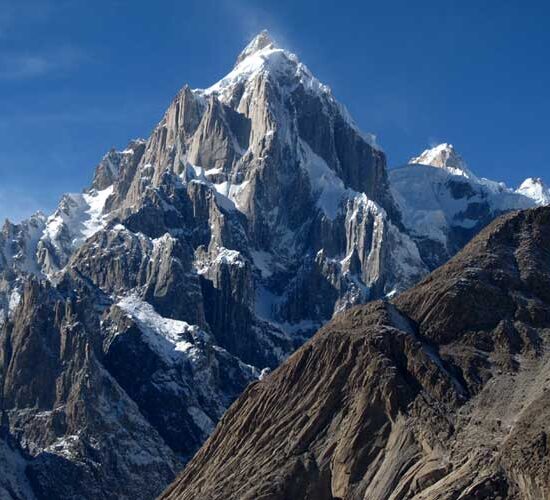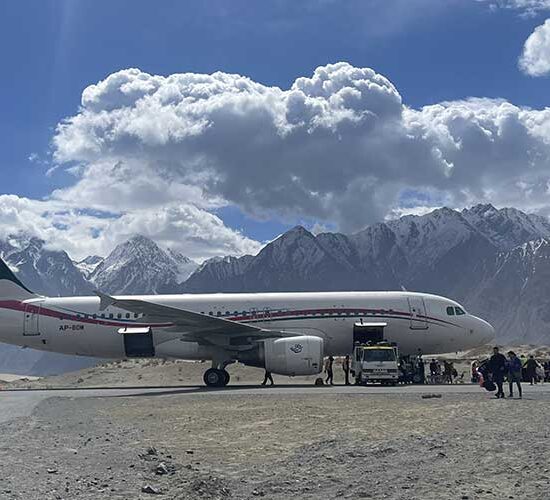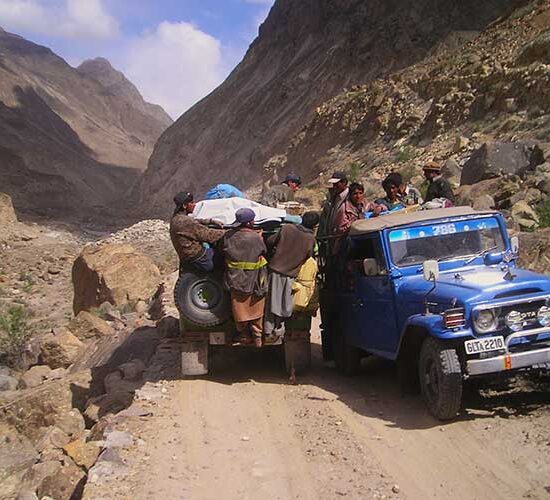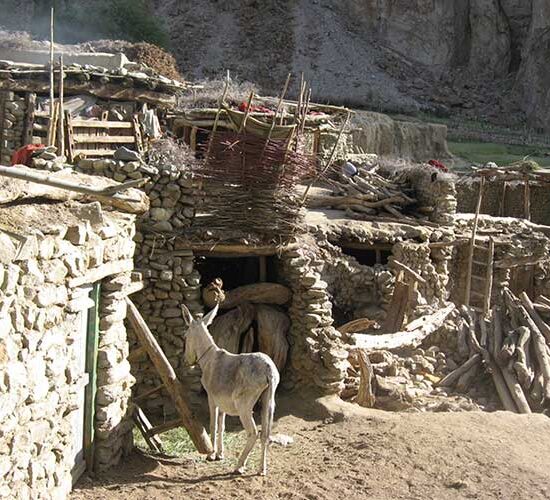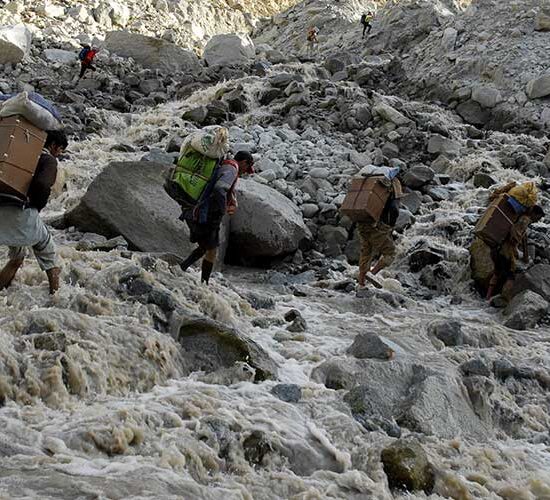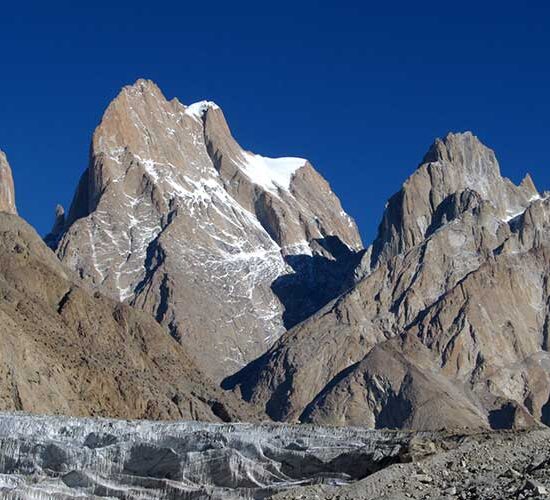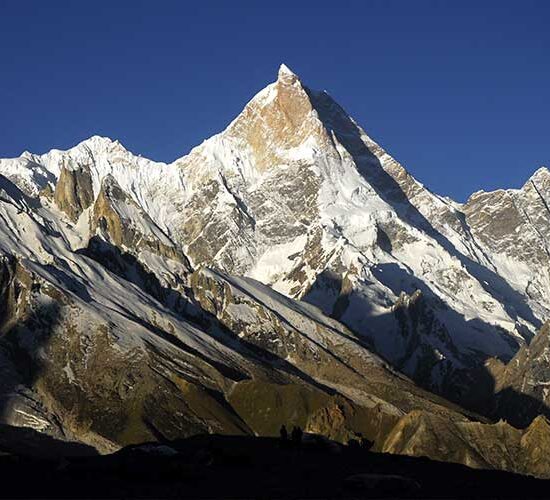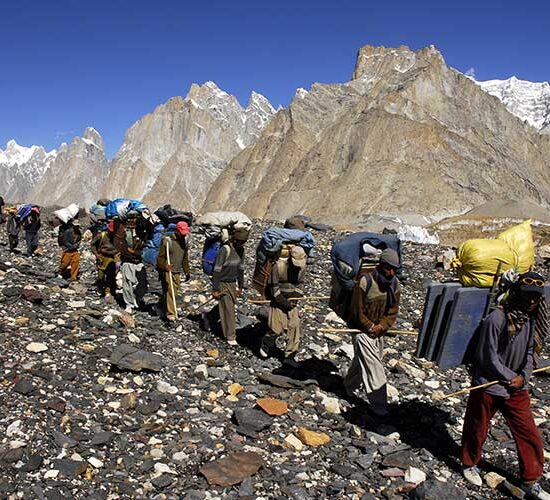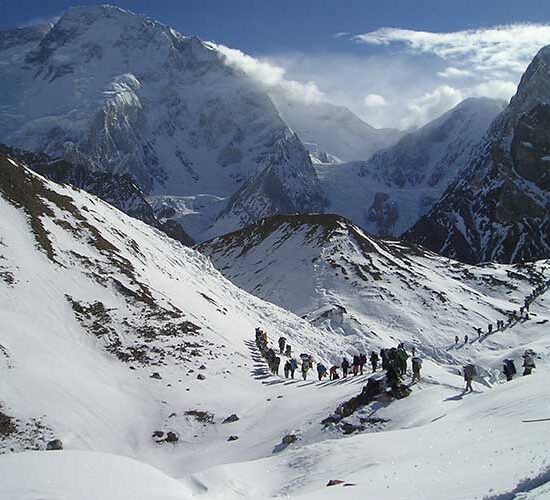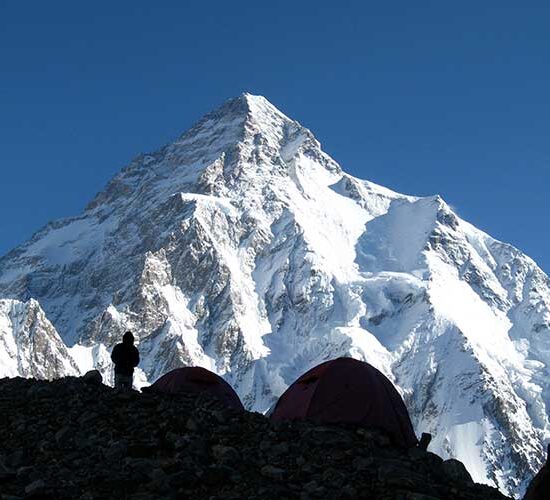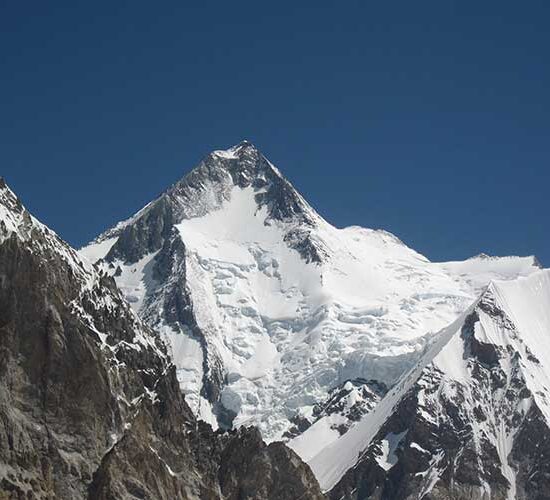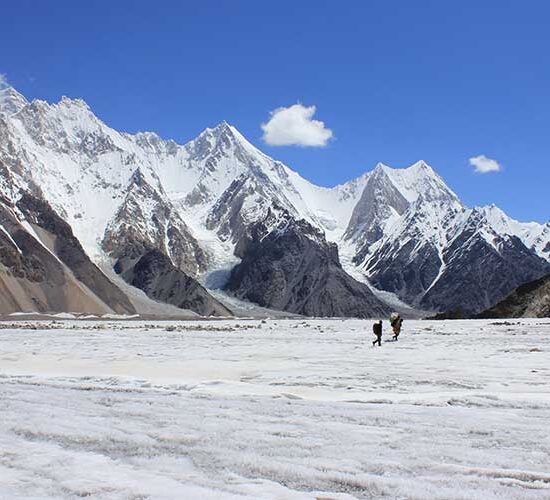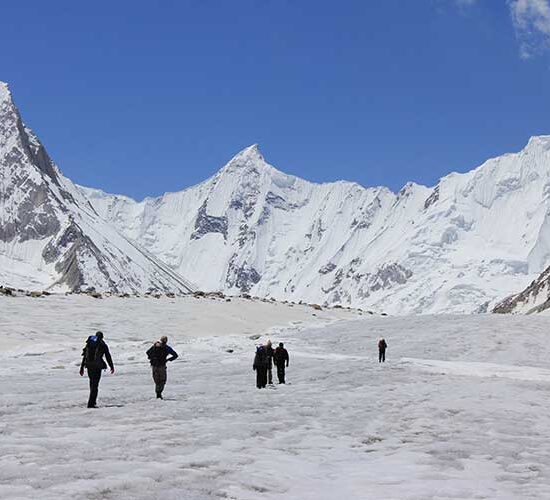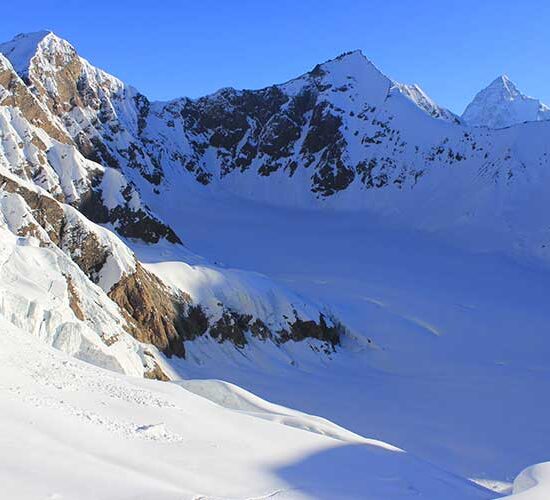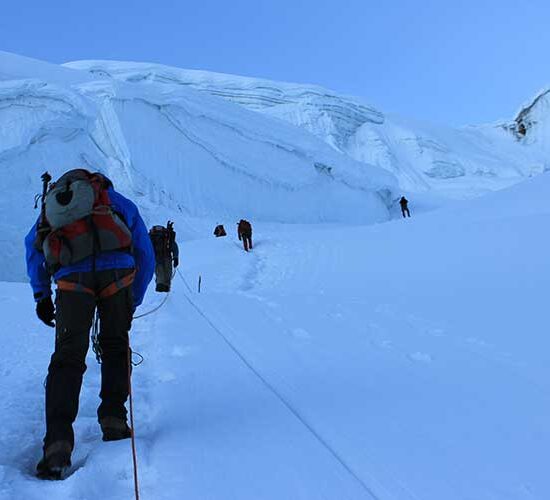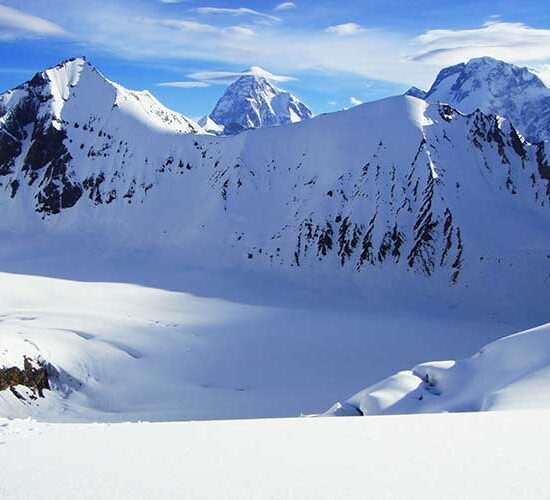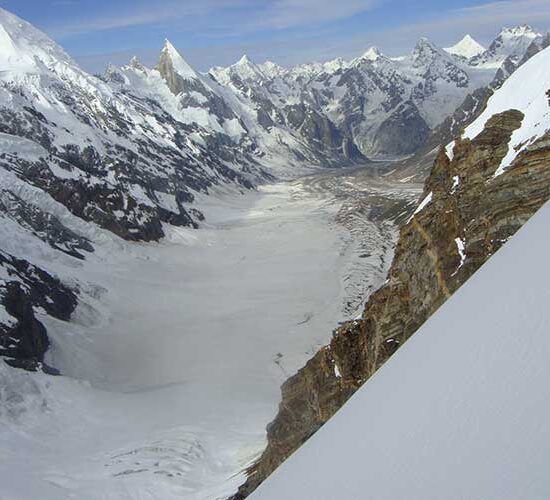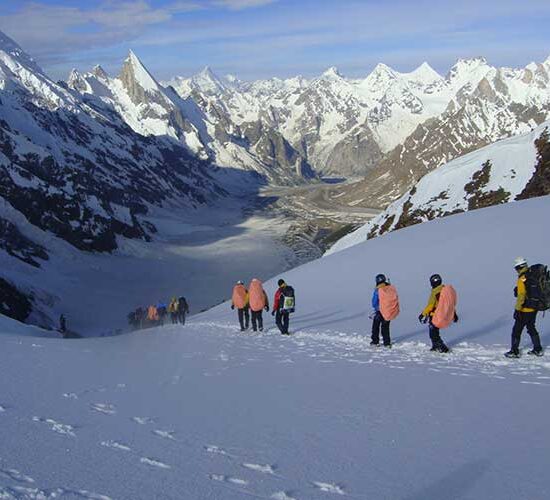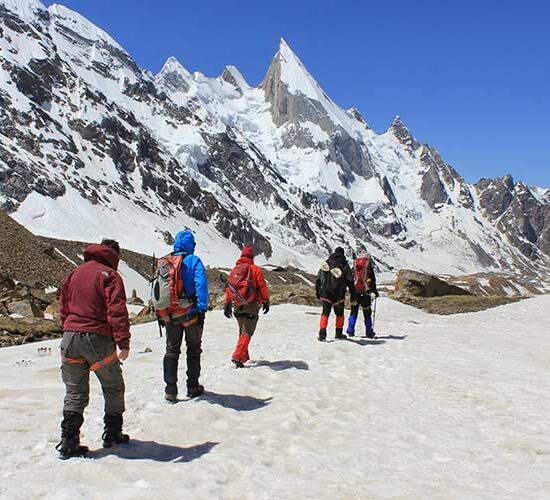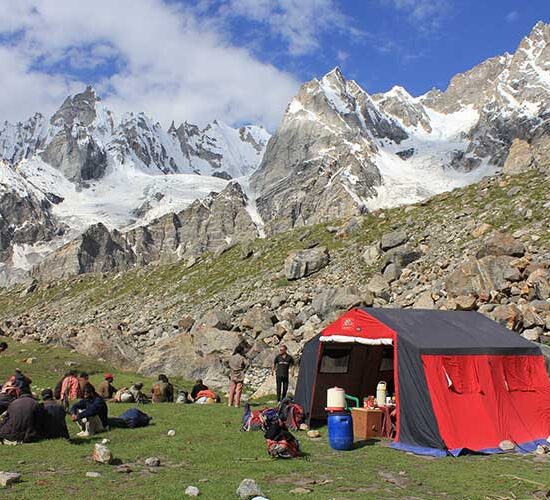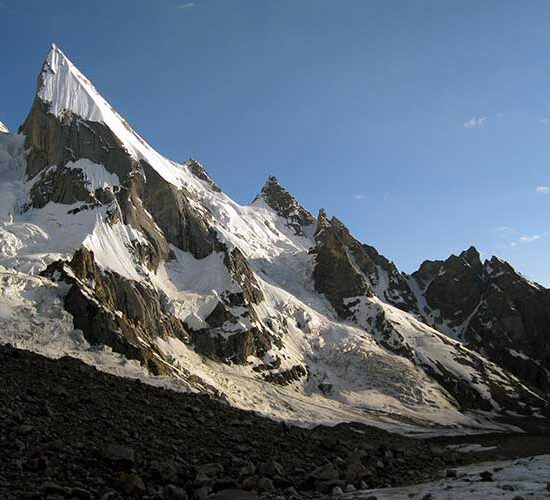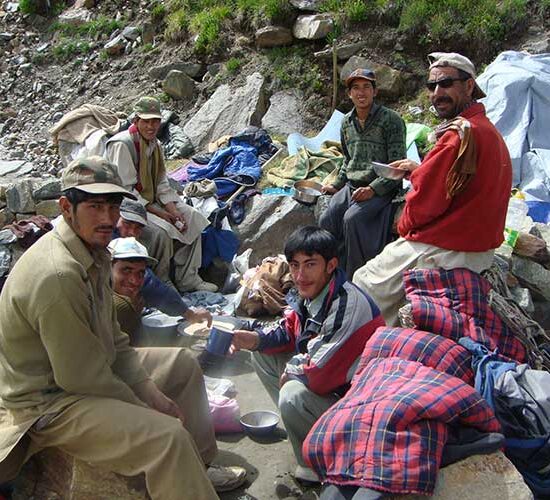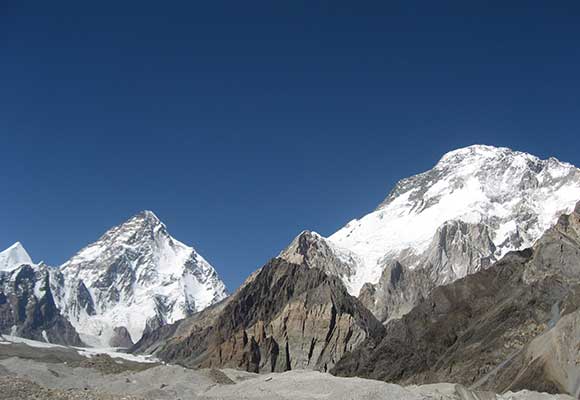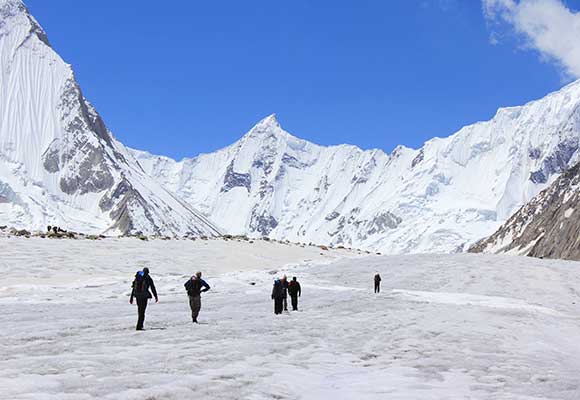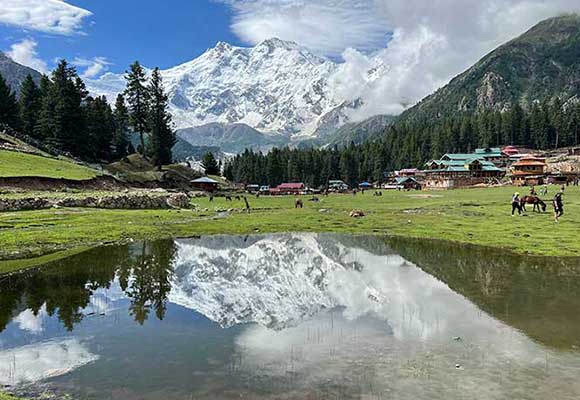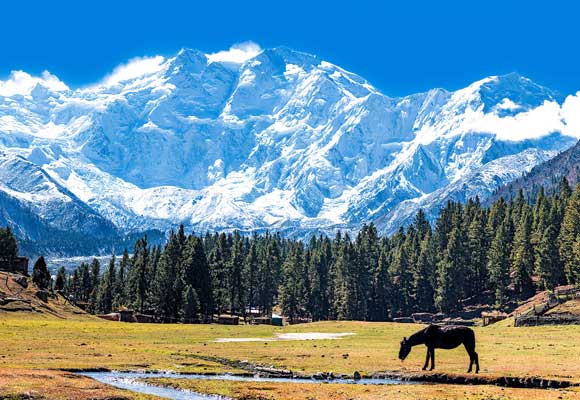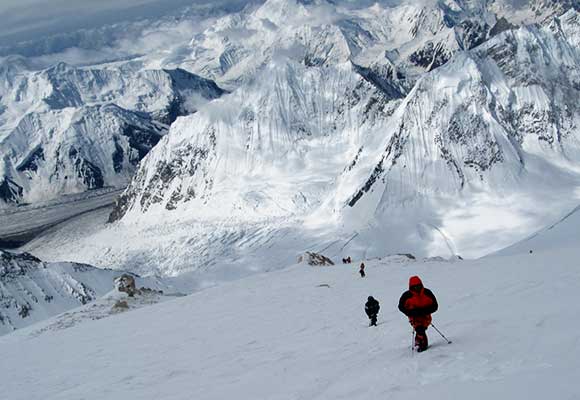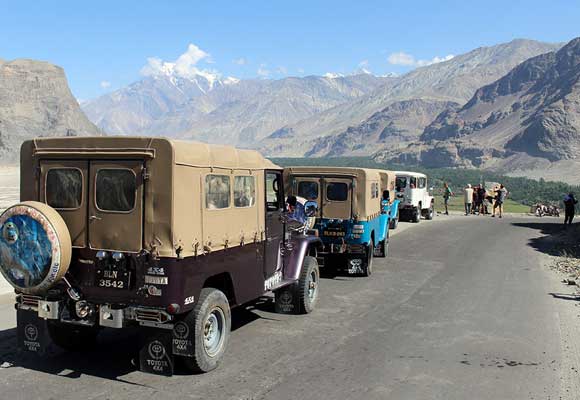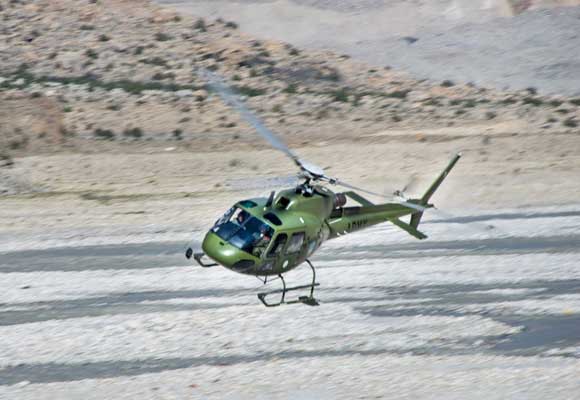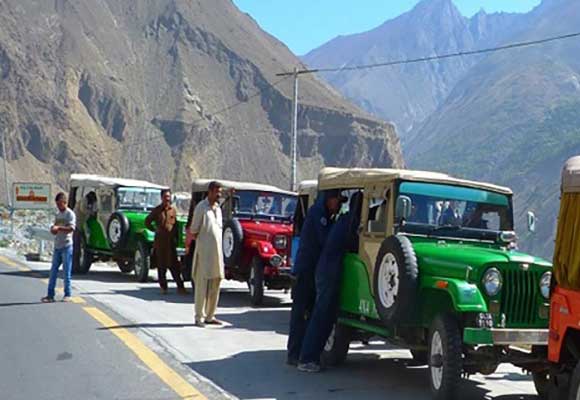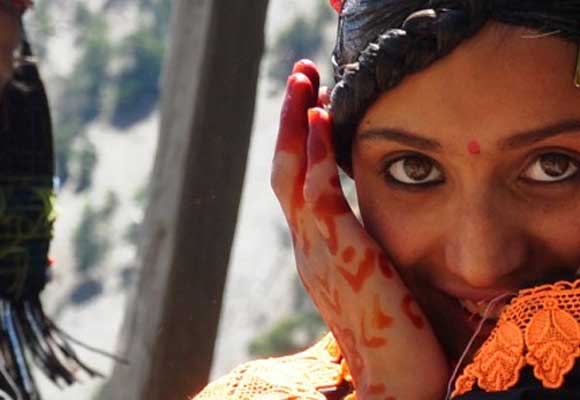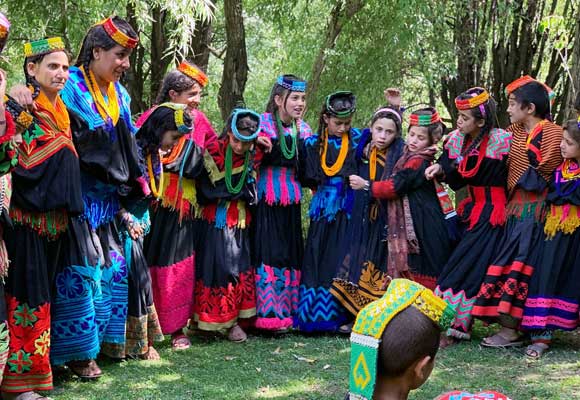K2 Base Camp Trek Concordia
Tour Category
Group Size
Duration
From
OVERVIEW & ITINERARY
K2 Base Camp Trek in Pakistan: A Journey of a Lifetime
The K2 Base Camp Trek is not just a hike—it’s a pilgrimage for trekkers and adventurers alike. The trek takes you into the heart of the Karakoram Range, where you will experience breathtaking views, challenging terrain, and the unmatched beauty of some of the world’s highest peaks. Whether you’re a seasoned trekker or a beginner looking to take on an ambitious adventure, this trek offers a chance to explore one of the most rugged and remote places on earth.
K2, the second-highest mountain in the world, towers at a height of 8,611 meters (28,251 feet) above sea level. As daunting as this might sound, the K2 Base Camp Trek is achievable for many who are well-prepared. It’s not just a physical challenge; it’s a test of endurance, mental resilience, and the ability to navigate through unpredictable weather and rocky paths. If you’ve been wondering how to prepare for this once-in-a-lifetime adventure, this guide will cover everything you need to know about the K2 Base Camp Distance, the Height of K2 Base Camp Trek, popular routes, what to expect, and how to get ready for the trek.
Understanding the K2 Base Camp Trek
The K2 Base Camp Trek is located in Pakistan’s northern Gilgit-Baltistan region, offering trekkers a rare opportunity to witness the towering peaks of the Karakoram Range. The trek takes adventurers through glacial valleys, snow-capped mountains, and scenic meadows before reaching the iconic K2 Base Camp.
K2, unlike Everest, has earned a reputation for being a more technical mountain to climb, and its surrounding terrain is similarly challenging. While this trek doesn’t require advanced mountaineering skills, trekkers will need to be fit, mentally prepared, and ready for the long and strenuous journey. Reaching the base camp of K2 itself is a reward in itself, but the real magic is in the experience of trekking through the Karakoram Range, surrounded by towering peaks, deep valleys, and vast glaciers.
K2 Base Camp Distance and Duration
One of the first things trekkers inquire about when considering the K2 Base Camp Trek is the K2 Base Camp Distance. The distance to the base camp can vary slightly depending on the route chosen, but in general, the trek covers a total distance of about 90 kilometers (56 miles) one way. This is a challenging distance, especially considering the high-altitude environment and unpredictable weather conditions.
The trek itself generally takes around 10 to 14 days, depending on factors such as the trekking pace, weather, and acclimatization needs. The average day’s trek involves 6-8 hours of walking, with the terrain ranging from rocky trails and steep inclines to glacial surfaces. You’ll need to be prepared for not just the physical effort but the mental perseverance required to stay focused and motivated through challenging conditions.
Height of K2 Base Camp Trek
The Height of K2 Base Camp Trek is approximately 5,150 meters (16,896 feet) above sea level. This is considered a high-altitude trek, and at this height, the air contains less oxygen, which increases the difficulty of the trek. While this altitude is far lower than K2’s summit, the trek still comes with the risks associated with high-altitude trekking, such as altitude sickness.
Altitude sickness is a common issue on the K2 Base Camp Trek and can affect even the most experienced trekkers. It’s essential to recognize the symptoms, which include headaches, dizziness, nausea, and fatigue. If you experience any of these symptoms, it’s crucial to rest and allow your body to acclimatize. Most treks to K2 Base Camp include acclimatization days, where trekkers rest in high-altitude locations to help adjust to the lower oxygen levels.
Popular Routes for the K2 Base Camp Trek
There are several routes that can be taken to reach the K2 Base Camp, with the most popular being the Askole to K2 Base Camp route and the Shangrila Valley to K2 Base Camp route. Both routes start in the Skardu District of Gilgit-Baltistan and take trekkers through some of the most remote and stunning landscapes in the world.
1. Askole to K2 Base Camp Route
The Askole to K2 Base Camp route is the most commonly used route for trekkers and is considered the standard route. It starts in the village of Askole, which is the last inhabited village in the region and is accessible by jeep from Skardu. From here, trekkers make their way along the Baltoro Glacier, passing through valleys, ridges, and a series of iconic peaks such as Broad Peak, Gasherbrum IV, and Masherbrum.
The journey covers a distance of around 90 kilometers (56 miles) one way, and the trek can take anywhere between 10 to 14 days to complete. Along the way, trekkers cross numerous streams, and rocky moraine, and hike through sections of the Baltoro Glacier. The K2 Base Camp Distance itself is around 30 kilometers from Askole, but the overall journey can feel much longer due to the challenging terrain.
One of the key attractions of this route is the spectacular view of K2 from the base camp itself. Upon arrival, trekkers are rewarded with a close-up view of K2’s mighty peaks and its rugged glacier. The route also provides trekkers with an unforgettable experience of the remote, wild beauty of the Karakoram Range.
2. Shangrila Valley to K2 Base Camp Route
Another popular route is the Shangrila Valley to K2 Base Camp route, which is an alternative to the Askole route. This route begins in Shangrila Valley, known for its lush landscapes and dramatic scenery. From Shangrila, trekkers make their way to Skardu and head to Askole to join the standard Baltoro Glacier route. The distance and duration are roughly the same as the Askole route.
What makes this route unique is its initial transition from the green valley landscapes into the harsh, rocky terrain of the Karakoram. The early stages of the trek offer a contrast to the barren high-altitude areas encountered later, providing trekkers with diverse terrain and breathtaking views.
How To Trek to K2 Base Camp: Preparation and Tips
Trekking to K2 Base Camp requires more than just enthusiasm. It is a physically demanding journey that requires proper preparation, both physically and mentally. Here’s how to get ready for the K2 Base Camp Trek:
1. Physical Fitness
The first step in preparing for the K2 Base Camp Trek is to get physically fit. While this trek doesn’t require technical mountaineering skills, it is still a significant physical challenge. The high altitudes and rugged terrain can be taxing on the body, so it’s essential to prepare well in advance. Focus on building your stamina with long hikes, cardiovascular exercises like running, cycling, and swimming, and strength training, particularly for your legs and core muscles.
During your preparation, aim to hike with a weighted backpack to simulate the conditions of the trek. If possible, try to do some hikes in mountainous regions to get used to trekking at higher altitudes and on uneven terrain.
2. Acclimatization
Acclimatization is crucial when trekking to K2 Base Camp, given its high altitude. Altitude sickness can affect trekkers at any height above 3,000 meters (9,842 feet), so you must give your body time to adjust. Most trekking itineraries allow for acclimatization days, where trekkers rest and stay at various altitudes for a day or two before continuing. These rest days are important for adjusting to the lower oxygen levels and reducing the risk of altitude sickness.
3. Essential Gear and Equipment
Proper gear is essential for trekking to K2 Base Camp. Some of the most important items include:
- Trekking boots: Good-quality, comfortable trekking boots are essential for navigating rocky and uneven terrain.
- Clothing layers: Due to the varying temperatures, bring layers of clothing, including base layers, an insulating jacket, and waterproof clothing.
- Backpack: A durable and comfortable backpack will be essential for carrying your gear.
- Sleeping bag: A sleeping bag rated for cold temperatures is necessary, as temperatures at high altitudes can drop significantly.
- Trekking poles: These provide stability on uneven terrain and reduce the strain on your knees.
4. Hire a Guide or Join a Group
The K2 Base Camp Trek is not an easy one, and it’s highly recommended to either hire a local guide or join a trekking group. A guide will help you navigate the route, assist with acclimatization, and ensure your safety. Additionally, guides are familiar with local conditions, weather, and potential risks, which is invaluable when trekking in remote regions.
5. Mental Preparation
The K2 Base Camp Trek can be physically and mentally exhausting. The long days, challenging conditions, and unpredictable weather can take a toll on even the most experienced trekkers. It’s essential to mentally prepare yourself for moments of discomfort and fatigue.
Keep in mind that the trek is about the journey, not just the destination. The stunning landscapes and sense of achievement you’ll feel upon completing the trek will make all the challenges worthwhile.
You will be trekking for a total of 12 days including some rest days with our main destination being Concordia (4650m) from where you will be having an amazing and once in a lifetime 360-degree view of some of the highest and most impressive mountains in the world including 4 eight-thousanders with of course the magnificent K2! After reaching Concordia you will retrace your steps and hike back in the direction of Jhola / Askole. Even though you have already walked this route when going up, it will not be boring at all as the different viewing angle on the return will keep it very interesting and the scenery will remain totally incredible.
ITINERARY
Arrive in Islamabad, transfer to your hotel – you can choose to take rest or join a sightseeing tour in Islamabad, we will visit the Faisal Mosque, the Government buildings on Constitution Avenue, the Pakistan Monument and Daman-e-Koh to look out over the twin cities. In the evening meet in the hotel lobby to get to know all the group members and to discuss the plan for the next day. Overnight in Islamabad.
Transfer to the airport for flight to Skardu. If the weather is clear we will have the opportunity to see some of the majestic mountains of the north from the airplane window incl. Nanga Parbat. The rest of the day can be spend at leisure. In case of flight cancellation we will drive in two days on the famous KKH to Skardu with an overnight stay at Chilas.
Free day at leisure or drive to Skardu from Chilas.
For those who are interested we can have a sightseeing tour: Sadpara Lake, Skardu Bazaar, Kharpocho (Skardu) Fort. Overnight Skardu.
After breakfast proceed to Jhola in jeeps. It takes about six hours to drive from Skardu to Askoli. Askoli is the last village of Shigar valley, this used to be the starting point for the K2 Concordia trek but recently they have extended the road up to Jhola. The drive through the Braldu Gorge is guaranteed to knock your socks off! We will have lunch on the way, dinner will be in the camp, overnight in tents.
We start on a relatively easy trail for 3 – 4 hours crossing Burdumal campsites along a 2 km stretched sandy river beach. After lunch continue towards Paju for another 2 – 3 hours trek. The trail climbs to a vantage point providing a view of the Snout of Baltoro. In the far distance you can see a magnificent panorama of the Cathedral Towers, Paju can be a crowded campsite. Overnight in camp.
Rest day at Paju for local exploration. Enjoy the traditional music program and dancing by the local porters and other staff of the trekking teams. Overnight in camp.
Start trek for 5 – 8 hours. Gradual climb of Baltoro Glacier on the Southern edge. After about 2 hours the path divides at the snout of Baltoro Glacier where the left branch goes to the Base camp of Trango Towers and the Serpo Liligo Pass. Continue to the right climbing up on to the glacier that stretches up the valley 62 km long and 2 km wide. Further 2 – 3 hours steady climb on a long diagonal to the other side. Follow the southern edge to Liliwa and onward to Khuburse – a lovely walk for about 90 min. to the campsite with clear water. Overnight at camp.
4 -5 hours walking, mostly along the crest of lateral moraine with stunning views of Paju Peak, Chorichi Biaho, Trango Tower and so on. Urdukas is a spectacular campsite. Overnight in tent.
6 – 8 hours walking on glacier. The first hour of our walk is across difficult terrain with many crevasses; however the way is smoother and easier in the middle. Continue 2 – 3 hours to Ghoro I opposite of Yermanendo Glacier, falling down from the Masherbrum Pass. For the next 3 – 4 hours continue east up the Baltoro Glacier following the telephone wire from Army HQ Ghoro to Gasherbrum IV. Ghoro II campsite is pitched on the rocks and ice in the centre of the glacier with water from the glacier melt. Overnight in tent.
5 – 6 hours of relatively easy walking with spectacular views and gigantic mountain panorama, including Mustagata Tower, G IV, Matha Peak and the mighty K2. Camp at Concordia named by Martin Conway after the place Dela Concordia in Paris. Overnight in tent.
When we leave Concordia we first have to go through a more difficult part where two different glaciers (the Baltoro and Godwin-Austen glaciers) meet, then it is about 3 hours fairly easy walk over the Godwin-Austen glacier to the base camp of Broad Peak. From the base camp you have an even more spectacular view of the K2 than from Concordia, we set up camp here, the rest of the day the group can take it easy and maybe get something from the different expedition groups.
We leave early towards K2 base camp, about 3 hours walk, on arrival we visit the Gilkey memorial where deceased climbers are commemorated. In June and July there are many expeditions to the K2, the base camp will therefore be very lively and during the visit the group may get a bit of the "expedition atmosphere". After lunch we walk over the Godwin-Austen Glacier the same way back to Concordia (about 5 – 6 hours walk).
Today we will leave beautiful Concordia and start our return to Jhola / Askoli. Around 3 hours to Ghoro II.
4 – 5 hours.
7 -8 hours.
6 – 7 hours.
We drive back to Skardu by 4x4 Jeep. A nice hotel with comfortable bed & warm shower will be waiting for you! Trek debriefing at Skardu Tourism Department.
Transfer to Skardu airport for the flight to Islamabad. In case of flight cancellation we will drive to Chilas for overnight stay and next day onwards to Islamabad.
If we got a flight to Islamabad yesterday then we can spend today at leisure or have some additional sightseeing / souvenir shopping. Otherwise we will drive from Chilas to Islamabad today. Special farewell group dinner, overnight at hotel in Islamabad.
Transfer to the airport for your home flight.
WHAT'S INCLUDED
- Liaison with ministry of tourism in Islamabad for trekking permit process
- Trekking permit fee
- Visa Invitation Letter & Supporting documents
- 4X4 Jeep to Jhola from Skardu and return
- Domestic airfare Islamabad – Skardu – Islamabad incl. taxes, excl. excess baggage charges, if any.
- In case of flight cancellation: private air-conditioned transport by road in 2 days from Islamabad to Skardu (or vice versa) with 1 overnight stay mid-way.
- Standard tourist class hotel / guest house accommodation based on twin room sharing & breakfast (6 nights)
- All meals (breakfast, lunch & dinner) while on the trek
- Baggage allowance of 15 KG per trekker - which will be carried by a porter (additional luggage can be left in the hotel or in our Skardu office storage)
- Sleeping tent, mess/kitchen tent and toilet tent (for smaller groups there will be a mess-kitchen tent combi for larger groups these will be separate and will incl. tables and chairs)
- Kitchen equipment, crockery, cutlery, fuel and related community gear
- Wages and basic kit of guide, sirdar, cook and assistant(s)
- English-Speaking Trekking Guide
- Sightseeing in Islamabad incl. transport & English-speaking guide
- Bridge crossing and campsite fees
- Insurance of our field staff and low altitude porters (except helicopter rescue)
- Porterage at airports, hotels, toll taxes and parking fees etc.
WHAT'S NOT INCLUDED
- International airfare, airport tax, excess baggage charges
- Sleeping bags and mattresses
- Meals on general days are not included
- Medications, ground evacuations and helicopter rescue charges of any kind if any (please note that helicopter rescues in Pakistan are very expensive, if required the client will need to have proper insurance coverage for this)
- Room service, mini-bar, laundry, beverages, phone/communication bills and other items of personal nature
- Insurance liability / all clients need to arrange their own (travel & medical) insurance – Adventure Pakistan is not liable for any accidents, illness, damages, theft or any force majeure conditions
- Tips to our staff (if you are happy with their services)
- Any unforeseen cost related to (unplanned) changes in the program (caused by severe weather, natural disasters, extreme currency devaluation or any other external factors)
DATES & PRICES FOR K2 BASE CAMP TREK
Start Date |
End Date |
Price |
Deposit |
Status |
|
|---|---|---|---|---|---|
02 June 2025 |
21 June 2025 |
USD $2800 |
USD $300 |
Guaranteed |
|
16 June 2025 |
05 July 2025 |
USD $2800 |
USD $300 |
Guaranteed |
|
30 June 2025 |
19 July 2025 |
USD $2800 |
USD $300 |
Guaranteed |
|
14 July 2025 |
02 August 2025 |
USD $2800 |
USD $300 |
Guaranteed |
|
28 July 2025 |
16 August 2025 |
USD $2800 |
USD $300 |
Guaranteed |
|
11 August 2025 |
30 August 2025 |
USD $2800 |
USD $300 |
Guaranteed |
|
18 August 2025 |
06 September 2025 |
USD $2800 |
USD $300 |
Guaranteed |
|
30 August 2025 |
19 September 2025 |
USD $2800 |
USD $300 |
Guaranteed |
|
07 September 2025 |
27 September 2025 |
USD $2800 |
USD $300 |
Guaranteed |
|
21 September 2025 |
11 October 2025 |
USD $2800 |
USD $300 |
Guaranteed |
|
28 September 2025 |
18 October 2025 |
USD $2800 |
USD $300 |
Guaranteed |
|
11 October 2025 |
31 October 2025 |
USD $2800 |
USD $300 |
Guaranteed |
ROUTE MAP
K2 Base Camp Trek in Pakistan: A Journey of a Lifetime
The K2 Base Camp Trek is not just a hike—it’s a pilgrimage for trekkers and adventurers alike. The trek takes you into the heart of the Karakoram Range, where you will experience breathtaking views, challenging terrain, and the unmatched beauty of some of the world’s highest peaks. Whether you’re a seasoned trekker or a beginner looking to take on an ambitious adventure, this trek offers a chance to explore one of the most rugged and remote places on earth.
K2, the second-highest mountain in the world, towers at a height of 8,611 meters (28,251 feet) above sea level. As daunting as this might sound, the K2 Base Camp Trek is achievable for many who are well-prepared. It’s not just a physical challenge; it’s a test of endurance, mental resilience, and the ability to navigate through unpredictable weather and rocky paths. If you’ve been wondering how to prepare for this once-in-a-lifetime adventure, this guide will cover everything you need to know about the K2 Base Camp Distance, the Height of K2 Base Camp Trek, popular routes, what to expect, and how to get ready for the trek.
Understanding the K2 Base Camp Trek
The K2 Base Camp Trek is located in Pakistan’s northern Gilgit-Baltistan region, offering trekkers a rare opportunity to witness the towering peaks of the Karakoram Range. The trek takes adventurers through glacial valleys, snow-capped mountains, and scenic meadows before reaching the iconic K2 Base Camp.
K2, unlike Everest, has earned a reputation for being a more technical mountain to climb, and its surrounding terrain is similarly challenging. While this trek doesn’t require advanced mountaineering skills, trekkers will need to be fit, mentally prepared, and ready for the long and strenuous journey. Reaching the base camp of K2 itself is a reward in itself, but the real magic is in the experience of trekking through the Karakoram Range, surrounded by towering peaks, deep valleys, and vast glaciers.
K2 Base Camp Distance and Duration
One of the first things trekkers inquire about when considering the K2 Base Camp Trek is the K2 Base Camp Distance. The distance to the base camp can vary slightly depending on the route chosen, but in general, the trek covers a total distance of about 90 kilometers (56 miles) one way. This is a challenging distance, especially considering the high-altitude environment and unpredictable weather conditions.
The trek itself generally takes around 10 to 14 days, depending on factors such as the trekking pace, weather, and acclimatization needs. The average day’s trek involves 6-8 hours of walking, with the terrain ranging from rocky trails and steep inclines to glacial surfaces. You’ll need to be prepared for not just the physical effort but the mental perseverance required to stay focused and motivated through challenging conditions.
Height of K2 Base Camp Trek
The Height of K2 Base Camp Trek is approximately 5,150 meters (16,896 feet) above sea level. This is considered a high-altitude trek, and at this height, the air contains less oxygen, which increases the difficulty of the trek. While this altitude is far lower than K2’s summit, the trek still comes with the risks associated with high-altitude trekking, such as altitude sickness.
Altitude sickness is a common issue on the K2 Base Camp Trek and can affect even the most experienced trekkers. It’s essential to recognize the symptoms, which include headaches, dizziness, nausea, and fatigue. If you experience any of these symptoms, it’s crucial to rest and allow your body to acclimatize. Most treks to K2 Base Camp include acclimatization days, where trekkers rest in high-altitude locations to help adjust to the lower oxygen levels.
Popular Routes for the K2 Base Camp Trek
There are several routes that can be taken to reach the K2 Base Camp, with the most popular being the Askole to K2 Base Camp route and the Shangrila Valley to K2 Base Camp route. Both routes start in the Skardu District of Gilgit-Baltistan and take trekkers through some of the most remote and stunning landscapes in the world.
1. Askole to K2 Base Camp Route
The Askole to K2 Base Camp route is the most commonly used route for trekkers and is considered the standard route. It starts in the village of Askole, which is the last inhabited village in the region and is accessible by jeep from Skardu. From here, trekkers make their way along the Baltoro Glacier, passing through valleys, ridges, and a series of iconic peaks such as Broad Peak, Gasherbrum IV, and Masherbrum.
The journey covers a distance of around 90 kilometers (56 miles) one way, and the trek can take anywhere between 10 to 14 days to complete. Along the way, trekkers cross numerous streams, and rocky moraine, and hike through sections of the Baltoro Glacier. The K2 Base Camp Distance itself is around 30 kilometers from Askole, but the overall journey can feel much longer due to the challenging terrain.
One of the key attractions of this route is the spectacular view of K2 from the base camp itself. Upon arrival, trekkers are rewarded with a close-up view of K2’s mighty peaks and its rugged glacier. The route also provides trekkers with an unforgettable experience of the remote, wild beauty of the Karakoram Range.
2. Shangrila Valley to K2 Base Camp Route
Another popular route is the Shangrila Valley to K2 Base Camp route, which is an alternative to the Askole route. This route begins in Shangrila Valley, known for its lush landscapes and dramatic scenery. From Shangrila, trekkers make their way to Skardu and head to Askole to join the standard Baltoro Glacier route. The distance and duration are roughly the same as the Askole route.
What makes this route unique is its initial transition from the green valley landscapes into the harsh, rocky terrain of the Karakoram. The early stages of the trek offer a contrast to the barren high-altitude areas encountered later, providing trekkers with diverse terrain and breathtaking views.
How To Trek to K2 Base Camp: Preparation and Tips
Trekking to K2 Base Camp requires more than just enthusiasm. It is a physically demanding journey that requires proper preparation, both physically and mentally. Here’s how to get ready for the K2 Base Camp Trek:
1. Physical Fitness
The first step in preparing for the K2 Base Camp Trek is to get physically fit. While this trek doesn’t require technical mountaineering skills, it is still a significant physical challenge. The high altitudes and rugged terrain can be taxing on the body, so it’s essential to prepare well in advance. Focus on building your stamina with long hikes, cardiovascular exercises like running, cycling, and swimming, and strength training, particularly for your legs and core muscles.
During your preparation, aim to hike with a weighted backpack to simulate the conditions of the trek. If possible, try to do some hikes in mountainous regions to get used to trekking at higher altitudes and on uneven terrain.
2. Acclimatization
Acclimatization is crucial when trekking to K2 Base Camp, given its high altitude. Altitude sickness can affect trekkers at any height above 3,000 meters (9,842 feet), so you must give your body time to adjust. Most trekking itineraries allow for acclimatization days, where trekkers rest and stay at various altitudes for a day or two before continuing. These rest days are important for adjusting to the lower oxygen levels and reducing the risk of altitude sickness.
3. Essential Gear and Equipment
Proper gear is essential for trekking to K2 Base Camp. Some of the most important items include:
- Trekking boots: Good-quality, comfortable trekking boots are essential for navigating rocky and uneven terrain.
- Clothing layers: Due to the varying temperatures, bring layers of clothing, including base layers, an insulating jacket, and waterproof clothing.
- Backpack: A durable and comfortable backpack will be essential for carrying your gear.
- Sleeping bag: A sleeping bag rated for cold temperatures is necessary, as temperatures at high altitudes can drop significantly.
- Trekking poles: These provide stability on uneven terrain and reduce the strain on your knees.
4. Hire a Guide or Join a Group
The K2 Base Camp Trek is not an easy one, and it’s highly recommended to either hire a local guide or join a trekking group. A guide will help you navigate the route, assist with acclimatization, and ensure your safety. Additionally, guides are familiar with local conditions, weather, and potential risks, which is invaluable when trekking in remote regions.
5. Mental Preparation
The K2 Base Camp Trek can be physically and mentally exhausting. The long days, challenging conditions, and unpredictable weather can take a toll on even the most experienced trekkers. It’s essential to mentally prepare yourself for moments of discomfort and fatigue.
Keep in mind that the trek is about the journey, not just the destination. The stunning landscapes and sense of achievement you’ll feel upon completing the trek will make all the challenges worthwhile.
You will be trekking for a total of 12 days including some rest days with our main destination being Concordia (4650m) from where you will be having an amazing and once in a lifetime 360-degree view of some of the highest and most impressive mountains in the world including 4 eight-thousanders with of course the magnificent K2! After reaching Concordia you will retrace your steps and hike back in the direction of Jhola / Askole. Even though you have already walked this route when going up, it will not be boring at all as the different viewing angle on the return will keep it very interesting and the scenery will remain totally incredible.
gallery
Frequently Asked Questions
What will the weather on the K2 Base Camp Trek be like?
The temperature will vary a lot and in general the weather is becoming more unpredictable due to climate change. The first few days of the K2 trek can be very hot around 30 degrees or even more and after that it will become cooler, in the night it can be between 10 to -10. It is of course also possible that it rains or snows. Kindly find a detailed overview below:
Islamabad:
Characterized by high humidity and potential monsoon rain occurrences.
Average Temperatures: High: 35°C / 95°F, Low: 24°C / 76°F.
Skardu:
Days range from warm to hot without humidity.
The bustling bazaar road is often dusty.
Evenings provide cooler and delightful conditions.
Possibility of wind and dust storms.
July experiences the warmest weather.
High: 23°C / 73.4°F, Low: 10°C / 50°F.
Note: Due to the heightened sun exposure in the mountains, temperatures can feel warmer than they actually are.
3,000 – 3,500 Meters:
Daytime conditions: Hot, exposed, and dusty.
Nights: Cooler, but not typically freezing.
Unlikely possibility of snow at approximately 3,500 meters.
Development of cloud cover is conceivable at any elevation.
3,500 – 4,500 Meters:
Daytime warmth persists, while mornings and evenings exhibit a chill.
Night temperatures can dip below freezing beyond 4,000 meters.
Rain, snow, and cloud cover can manifest at any juncture.
Greater presence of ice on the Baltoro Glacier.
4,500 – 5,600 Meters:
Nights encounter freezing temperatures.
Days range from cool to cold, with intermittent warm sunshine.
Continuous potential for rain, snow, and cloud cover.
The trail between Concordia and Ali Camp is likely to be covered in deep snow.
Trekking on icy and snowy surfaces from Concordia to K2 Base Camp.
Gondogoro La ascent/descent could encounter a substantial snow pack.
Coldest temperatures could dip to around -10°C / 14°F.
How fit do I need to be for the K2 Base Camp Trek?
Undertaking the K2 Base Camp Trek requires a commendable level of fitness to ensure a safe and rewarding journey. Here’s a detailed overview of what you need to consider:
Physical Preparedness: Participants are expected to be in good physical shape, capable of traversing mixed terrains for extended periods, with trekking days averaging around 5 hours and a maximum of 8 hours. It’s worth noting that we enlist the assistance of local porters and mules to carry supplies, optimizing comfort during the trek to K2.
Best Preparatory Approach: The most effective way to gear up for the K2 Base Camp Trek is no secret – it’s to engage in hiking as frequently as possible during the months leading up to the expedition.
Environmental Challenges: Although there’s no mountaineering involved, it’s imperative to be in optimal shape. The distances covered can be substantial, terrains can be demanding, and oxygen levels are lower than what you’re accustomed to. Your readiness to navigate these environmental factors is pivotal.
Physical Conditioning Essentials: Drawing parallels with preparing for other multi-day backpacking adventures, certain core aspects deserve attention:
Endurance: Building endurance is crucial to sustaining energy levels throughout the trek.
Strength: Focusing on strengthening key muscle groups such as legs, glutes, back, and joints aids in negotiating challenging terrain and minimizing injury risks.
Cardiovascular Fitness: Enhanced cardiovascular health ensures stamina for the journey.
Stability and Flexibility: Including stability exercises and post-trek stretching routines enhances agility and prevents strain.
Recommended Exercises: Incorporate a well-rounded workout routine that targets critical muscle areas.
Include exercises like squats, lunges, sled pushes, burpees, stair climbing, and step-ups. After your workouts, dedicate time to stability exercises and comprehensive stretching to enhance flexibility and alleviate muscle tension.
Conclusion: Ultimately, the extent of your fitness level will significantly influence the quality of your K2 Base Camp Trek experience. By combining endurance, strength, cardiovascular health, stability, and flexibility, you’ll be well-prepared to conquer the challenges and savor the wonders of this remarkable journey.
What will the food be like on the trek?
Breakfast: Typically includes an omelet / fried / boiled eggs, fried Pakistani bread (paratha), chappati, toast, pancakes, porridge, cereal, jam, Nutella, honey, marmalade, cheese etc + green tea / coffee / milk tea.
Lunch: unlike other trekking agencies we do not provide packed lunch instead we will have fresh lunch which includes soup, tuna fish, boiled pottatos, eggs, assorted cookies, bread, cheese, dried fruits & nuts, green tea / coffee / juice
Dinner: we start each dinner with a nice warm soup, after that there will be variation of dishes which changes each day. different vegetable dishes, varies types of meat (chicken, beef or mutton) accompanied by rice, noodles, pasta, lentils, potatoes, French fries and or chappati bread. We of course won’t forget dessert, there will be (fresh) fruit and or a type of pudding at every dinner.
Snacks: between lunch and dinner there will be a daily variation of cookies, pakora, popcorn etc. and hot beverages
Note: we will also take into account your specific dietary requirements, for example vegetarian / vegan / lactose intolerant – please don’t hesitate to contact us about the possibilities.
Will we fly to the mountains from Islamabad?
This will depend on your specific itinerary and your own preferences, where possible. For the standard K2 and K2 Gondogoro La and Snow Lake treks we normally schedule the flight on day 2 of your itinerary where we will fly from Islamabad to Skardu. This is a very scenic flight, if the weather is clear you will be able to get amazing mountain views including the 9th highest mountain in the world, Nanga Parbat. When the weather is bad the flight to Skardu might get cancelled, if this happens we will drive in 2 days from Islamabad to Skardu with an overnight stay halfway. There will always be a contingency day in your itinerary to cover for this delay.
What is the luggage allowance on the trek?
Each trekking member has a 15 kg baggage allowance. This is for your main luggage that will be carried to each camp each day of the trek. You yourself are only required to carry a small daypack while trekking – here you can put anything you might need during the day like water, energybars, sunglasses, suncream, clothing etc. If your main backpack/duffle bag weighs more than 15 kg, you will need to pay for the additional weight. Cost for additional weight will be determined on the ground as prices for porters vary by the season. For the K2 treks it is possible to leave excess luggage in our office storage room or at your hotel and pick it up at the end of the trek. Please also kindly note that the baggage allowance on the domestic flights is currently 20 kg check-in and 7 kg hand-carry.
Is there electricity on the trek?
We carry solar panels (no diesel or petrol generators to avoid noise & air pollution), so that each trekking member can charge batteries, power banks, phones, etc while on the trek.
I am a Solo Woman. Is it safe for me to join the K2 Base Camp Trek?
We have had many solo woman trekkers on our K2 base camp treks, our groups consist of a great variety of nationalities ranging from Europe, North and South America, Canada to China, Japan, South Korea, Malaysia, Australia and New Zealand with around 35 to 40% being women.
Is it safe to travel in Pakistan?
It is a fair question to ask as we know that most of the news from Pakistan is not so positive, but the image which people have abroad is far from the reality. Although there have been valid reasons for people to consider Pakistan as not very safe, a lot has changed in recent years. The security situation has improved dramatically and the government has been making efforts to promote tourism and facilitate travel. When you visit you will notice immiediately that Pakistanis are very hospitable people, they are eager to get to know you and often will invite you in their home. Pakistan is a huge country, we only offer tours and treks to areas which we deem safe. We currently don’t recommend to travel to the border region with Afghanistan and certain parts of Balochistan but most other places can be visited without any problem. If you prefer to start with the safest region then we would recommend Gilgit-Baltistan in the north, the people here largely depend on tourism for their income and have been warmly welcoming foreign tourist for many years.
Can anyone go on a trek?
Yes and no, it is your own responsibility to select a trek that is suitable for you in terms of you personal fitness level as well as experience – if you book a private trek then you have all the flexibility to customize it and for example add extra days or extra supporting staff if needed. If you book a trek with an open group then we try to only let people join who have a certain experience level. Please don’t hesitate to contact us in case you would like us to help you select the best trek for you.
Do you offer customized tours / treks?
Yes, all the tours and treks that we offer on our website can be completely customized to your own requirements. We are also happy to design a tailor-made tour for you from scratch. Just let us know your preferences, special interests, number of days you have available etc. and we will send you our personalized itinerary suggestions.
Do I need a trekking visa?
For certain types of treks you will require a trekking visa – for example all the K2 treks. If a trekking visa is required then we will inform you accordingly during your booking, there are a lot of treks which are not in a restricted area and therefore you will only need a standard tourist visa.
How long in advance do I need to apply for my visa?
If you have to apply for a standard tourist visa then 1 month in advance should be sufficient – in most cases you will receive your visa within a few days / a week – you should not apply more than 3 months in advance. If you have to apply for a trekking visa then you will need to be prepared for a longer processing time, we recommend to apply 3 to 2 months in advance.
Which gear do I need to bring on my trek?
We will provide you with a suggested packing list after you have booked your tour with us. For most treks it will be standard personal trekking gear like proper hiking boots, optional trekking poles, gaitors, sleeping bag, sleeping pad etc. For certain treks further items are advised – for example for the K2 Gondogoro La and Snow Lake treks you require crampons and a climbing belt set with carabiners and a sling so that you can clip yourself on a rope and you might want to bring a climbing helmet for sections where there can be rockfall.
Can I rent trekking gear from you?
Yes, it is possible to rent certain items from us or we will put you in contact with a trusted local supplier who can provide you with the things you need. Some of the standard gear which we can arrange are crampons, climbing belts, ice axes and climbing helmets.
What is the best time to go on a trek?
The summer period is the main trekking season in the north of Pakistan. For most treks this would be from June to September with July and August being the best months.
What happens in case of an emergency during the trek?
On each trek your guide will be in possesion of a phone and where needed (during remote treks) a sattelite phone as well as a medical aid kit. All our guides are aware of the standard emergency protocols and will contact our headoffice staff as well as the relevant authorities when needed. Before you go on a trek with us we will require your emergency contact list as well as your travel insurance details with proper coverage for emergency (helicopter) rescue in mountainous areas. Depending on the situation we will contact your insurance company and together with them will make arrangements for your repatriation. We have many years of experience with search and rescue operations and good relations with all relevant institutions including Askari Aviation for helicopter rescue operations. If you have the right insurance coverage then we will be able to initiate a helicopter rescue immidiately – please kindly note that helicopters in Pakistan always fly in pairs and availability of the helicopters depends on them not being in use on another mission as well as the weather being suitable.
What kind of travel insurance do I need?
This will depend on the type of tour that you are planning. Please make sure to consult your travel insurance before your trip to make sure you have proper coverage for your tour and the activities you will undertake. Especially when you go on a trek it is important to have mountain emergency search and rescue / repatriation by helicopter included in your insurance package.
I'm a woman, should I wear a headscarf when I'm in Pakistan?
It is not needed to wear a headscarf, of course you may do so if you feel more comfortable. It will be good however to bring a scarf which you can wear when visiting a mosque or other religious site and or when going to a more conservative area.
Is there a recommended dress code?
Pakistan is an Islamic country and it is therefore advisable for women not to wear short skirts / tops or short trousers in public. A headscarf will come in handy for women when they visit a mosque / religious site or sometimes it can be a custom in more remote / conservative areas. Dress codes for men are more lenient, though shorts are uncommon – they can be worn depending on the places you visit on a certain day (for example if you visit a mosque, sacred site or very conservative area it might be better to adjust your clothes to a more modest style – feel free to ask your guide if you are not sure). If you are going on a trek you can wear shorts without any problems.
Can I visit Pakistan in winter?
Yes, you defintely can. The south of Pakistan is actually the best to be visited in the winter as it will be way too hot in the summer. Also the north has great options, you can go skiing or make a nice winter hike. Some passes in the north will be closed due to snow which means we will have to adjust certain itineraries but there are enough places which you can visit. Please don’t hesitate to inquire about the possibilities.
Do I need a visa for this trip?
For all trips to Pakistan you will require a visa, depending on the the type of tour you will either need a standard tourist visa or a trekking visa. Our sales team will provide you with all the necessary information as well as a visa invitation letter and related supporting documents after you have booked your tour with us.
How much price about tour & travels
Lorem ipsum dolor sit amet, utinam munere antiopam vel ad. Qui eros iusto te. Nec ad feugiat honestatis. Quo illum detraxit an. Ius eius quodsi molestiae at, nostrum definitiones his cu. Discere referrentur mea id, an pri novum possim deterruisset. Eum oratio reprehendunt cu. Nec te quem assum postea.
Who will meet me on arrival?
An Adventure Pakistan representative will meet you at the airport and will bring you to your hotel.
Where do I fly to for this trip?
You will fly roundtrip to Islamabad, Pakistan.
Do I need to bring my own sleeping bag and pad for this trip?
Yes. You will need to bring your own sleeping bag, for the K2 treks and Snow Lake trek during the main summer season we recommend it to be suitable for temperatures up to minus 10 degrees Celsius / 15 Fahrenheit. It is also advisable to bring your own sleeping pad for comfort, please kindly keep in mind that on many days you will be sleeping on rock / snow / ice. For other treks we are happy to advise you on the type of sleeping bag depending on the season and location.
Will I have Wi-Fi on the trip?
Yes. You will have Wi-Fi in your hotel in Islamabad and Skardu, during the K2 trek there will be limited connectivity at Concordia. If you like we can also arrange a local SIM card for you with a mobile data package so that you can stay in touch more easily with your loved ones.
Why does Adventure Pakistan cost more than other companies?
We know that you will be able to find cheaper tour options but there are big differences in some of the services being offered. Most important to us is that all our clients have a safe and the greatest trip ever but also that our staff and supporting partners are paid fairly for all their hard work and big efforts. We do not compromise on safety, this means that we only work with experienced guides / supporting staff and drivers and that all vehicles and materials which we use during our treks and tours are of high quality and kept well maintained. You will always sleep in clean & safe accommodations / have proper camping gear and we inform you in advance at which hotels or guesthouses you will be staying so that you won’t have any suprises afterwards. We pay great attention to detail while preparing your trip so that you get the best possible & most enjoyable experience taking into account any special requirements you may have or assistance you would need, you can share your specific interests, fitness and experience level, dietary requirements etc. and we take care of the rest. Our staff is our key assest, we take great pride in having an incredible team of very experienced, very kind and caring guides and other supporting staff who will provide you with the best memories. Something we are known for during our treks is the excellent food which is being prepared by our cooking team, we don’t skimp on this as we know that good, tasty and varied food is vital during a trek. You will be looking forward to your meals each day this is something we can guarantee! One of the last things we would like to highlight is our network – we have a very extensive network all over Pakistan this means that if there is any problem during your trip we are able to respond adequatly, without any delay. Besides having a good network we also have many years of experience – we know what to do and whom to contact, our team carries out emergency and rescue operations for international insurance companies each year so you can rest assured that you will be in good hands.
What will the weather on the K2 Base Camp Trek be like?
The temperature will vary a lot and in general the weather is becoming more unpredictable due to climate change. The first few days of the K2 trek can be very hot around 30 degrees or even more and after that it will become cooler, in the night it can be between 10 to -10. It is of course also possible that it rains or snows. Kindly find a detailed overview below:
Islamabad:
Characterized by high humidity and potential monsoon rain occurrences.
Average Temperatures: High: 35°C / 95°F, Low: 24°C / 76°F.
Skardu:
Days range from warm to hot without humidity.
The bustling bazaar road is often dusty.
Evenings provide cooler and delightful conditions.
Possibility of wind and dust storms.
July experiences the warmest weather.
High: 23°C / 73.4°F, Low: 10°C / 50°F.
Note: Due to the heightened sun exposure in the mountains, temperatures can feel warmer than they actually are.
3,000 – 3,500 Meters:
Daytime conditions: Hot, exposed, and dusty.
Nights: Cooler, but not typically freezing.
Unlikely possibility of snow at approximately 3,500 meters.
Development of cloud cover is conceivable at any elevation.
3,500 – 4,500 Meters:
Daytime warmth persists, while mornings and evenings exhibit a chill.
Night temperatures can dip below freezing beyond 4,000 meters.
Rain, snow, and cloud cover can manifest at any juncture.
Greater presence of ice on the Baltoro Glacier.
4,500 – 5,600 Meters:
Nights encounter freezing temperatures.
Days range from cool to cold, with intermittent warm sunshine.
Continuous potential for rain, snow, and cloud cover.
The trail between Concordia and Ali Camp is likely to be covered in deep snow.
Trekking on icy and snowy surfaces from Concordia to K2 Base Camp.
Gondogoro La ascent/descent could encounter a substantial snow pack.
Coldest temperatures could dip to around -10°C / 14°F.
How fit do I need to be for the K2 Base Camp Trek?
Undertaking the K2 Base Camp Trek requires a commendable level of fitness to ensure a safe and rewarding journey. Here’s a detailed overview of what you need to consider:
Physical Preparedness: Participants are expected to be in good physical shape, capable of traversing mixed terrains for extended periods, with trekking days averaging around 5 hours and a maximum of 8 hours. It’s worth noting that we enlist the assistance of local porters and mules to carry supplies, optimizing comfort during the trek to K2.
Best Preparatory Approach: The most effective way to gear up for the K2 Base Camp Trek is no secret – it’s to engage in hiking as frequently as possible during the months leading up to the expedition.
Environmental Challenges: Although there’s no mountaineering involved, it’s imperative to be in optimal shape. The distances covered can be substantial, terrains can be demanding, and oxygen levels are lower than what you’re accustomed to. Your readiness to navigate these environmental factors is pivotal.
Physical Conditioning Essentials: Drawing parallels with preparing for other multi-day backpacking adventures, certain core aspects deserve attention:
Endurance: Building endurance is crucial to sustaining energy levels throughout the trek.
Strength: Focusing on strengthening key muscle groups such as legs, glutes, back, and joints aids in negotiating challenging terrain and minimizing injury risks.
Cardiovascular Fitness: Enhanced cardiovascular health ensures stamina for the journey.
Stability and Flexibility: Including stability exercises and post-trek stretching routines enhances agility and prevents strain.
Recommended Exercises: Incorporate a well-rounded workout routine that targets critical muscle areas.
Include exercises like squats, lunges, sled pushes, burpees, stair climbing, and step-ups. After your workouts, dedicate time to stability exercises and comprehensive stretching to enhance flexibility and alleviate muscle tension.
Conclusion: Ultimately, the extent of your fitness level will significantly influence the quality of your K2 Base Camp Trek experience. By combining endurance, strength, cardiovascular health, stability, and flexibility, you’ll be well-prepared to conquer the challenges and savor the wonders of this remarkable journey.
What will the food be like on the trek?
Breakfast: Typically includes an omelet / fried / boiled eggs, fried Pakistani bread (paratha), chappati, toast, pancakes, porridge, cereal, jam, Nutella, honey, marmalade, cheese etc + green tea / coffee / milk tea.
Lunch: unlike other trekking agencies we do not provide packed lunch instead we will have fresh lunch which includes soup, tuna fish, boiled pottatos, eggs, assorted cookies, bread, cheese, dried fruits & nuts, green tea / coffee / juice
Dinner: we start each dinner with a nice warm soup, after that there will be variation of dishes which changes each day. different vegetable dishes, varies types of meat (chicken, beef or mutton) accompanied by rice, noodles, pasta, lentils, potatoes, French fries and or chappati bread. We of course won’t forget dessert, there will be (fresh) fruit and or a type of pudding at every dinner.
Snacks: between lunch and dinner there will be a daily variation of cookies, pakora, popcorn etc. and hot beverages
Note: we will also take into account your specific dietary requirements, for example vegetarian / vegan / lactose intolerant – please don’t hesitate to contact us about the possibilities.
Will we fly to the mountains from Islamabad?
This will depend on your specific itinerary and your own preferences, where possible. For the standard K2 and K2 Gondogoro La and Snow Lake treks we normally schedule the flight on day 2 of your itinerary where we will fly from Islamabad to Skardu. This is a very scenic flight, if the weather is clear you will be able to get amazing mountain views including the 9th highest mountain in the world, Nanga Parbat. When the weather is bad the flight to Skardu might get cancelled, if this happens we will drive in 2 days from Islamabad to Skardu with an overnight stay halfway. There will always be a contingency day in your itinerary to cover for this delay.
What is the luggage allowance on the trek?
Each trekking member has a 15 kg baggage allowance. This is for your main luggage that will be carried to each camp each day of the trek. You yourself are only required to carry a small daypack while trekking – here you can put anything you might need during the day like water, energybars, sunglasses, suncream, clothing etc. If your main backpack/duffle bag weighs more than 15 kg, you will need to pay for the additional weight. Cost for additional weight will be determined on the ground as prices for porters vary by the season. For the K2 treks it is possible to leave excess luggage in our office storage room or at your hotel and pick it up at the end of the trek. Please also kindly note that the baggage allowance on the domestic flights is currently 20 kg check-in and 7 kg hand-carry.
Is there electricity on the trek?
We carry solar panels (no diesel or petrol generators to avoid noise & air pollution), so that each trekking member can charge batteries, power banks, phones, etc while on the trek.
I am a Solo Woman. Is it safe for me to join the K2 Base Camp Trek?
We have had many solo woman trekkers on our K2 base camp treks, our groups consist of a great variety of nationalities ranging from Europe, North and South America, Canada to China, Japan, South Korea, Malaysia, Australia and New Zealand with around 35 to 40% being women.
Is it safe to travel in Pakistan?
It is a fair question to ask as we know that most of the news from Pakistan is not so positive, but the image which people have abroad is far from the reality. Although there have been valid reasons for people to consider Pakistan as not very safe, a lot has changed in recent years. The security situation has improved dramatically and the government has been making efforts to promote tourism and facilitate travel. When you visit you will notice immiediately that Pakistanis are very hospitable people, they are eager to get to know you and often will invite you in their home. Pakistan is a huge country, we only offer tours and treks to areas which we deem safe. We currently don’t recommend to travel to the border region with Afghanistan and certain parts of Balochistan but most other places can be visited without any problem. If you prefer to start with the safest region then we would recommend Gilgit-Baltistan in the north, the people here largely depend on tourism for their income and have been warmly welcoming foreign tourist for many years.
Can anyone go on a trek?
Yes and no, it is your own responsibility to select a trek that is suitable for you in terms of you personal fitness level as well as experience – if you book a private trek then you have all the flexibility to customize it and for example add extra days or extra supporting staff if needed. If you book a trek with an open group then we try to only let people join who have a certain experience level. Please don’t hesitate to contact us in case you would like us to help you select the best trek for you.
Do you offer customized tours / treks?
Yes, all the tours and treks that we offer on our website can be completely customized to your own requirements. We are also happy to design a tailor-made tour for you from scratch. Just let us know your preferences, special interests, number of days you have available etc. and we will send you our personalized itinerary suggestions.
Do I need a trekking visa?
For certain types of treks you will require a trekking visa – for example all the K2 treks. If a trekking visa is required then we will inform you accordingly during your booking, there are a lot of treks which are not in a restricted area and therefore you will only need a standard tourist visa.
How long in advance do I need to apply for my visa?
If you have to apply for a standard tourist visa then 1 month in advance should be sufficient – in most cases you will receive your visa within a few days / a week – you should not apply more than 3 months in advance. If you have to apply for a trekking visa then you will need to be prepared for a longer processing time, we recommend to apply 3 to 2 months in advance.
Which gear do I need to bring on my trek?
We will provide you with a suggested packing list after you have booked your tour with us. For most treks it will be standard personal trekking gear like proper hiking boots, optional trekking poles, gaitors, sleeping bag, sleeping pad etc. For certain treks further items are advised – for example for the K2 Gondogoro La and Snow Lake treks you require crampons and a climbing belt set with carabiners and a sling so that you can clip yourself on a rope and you might want to bring a climbing helmet for sections where there can be rockfall.
Can I rent trekking gear from you?
Yes, it is possible to rent certain items from us or we will put you in contact with a trusted local supplier who can provide you with the things you need. Some of the standard gear which we can arrange are crampons, climbing belts, ice axes and climbing helmets.
What is the best time to go on a trek?
The summer period is the main trekking season in the north of Pakistan. For most treks this would be from June to September with July and August being the best months.
What happens in case of an emergency during the trek?
On each trek your guide will be in possesion of a phone and where needed (during remote treks) a sattelite phone as well as a medical aid kit. All our guides are aware of the standard emergency protocols and will contact our headoffice staff as well as the relevant authorities when needed. Before you go on a trek with us we will require your emergency contact list as well as your travel insurance details with proper coverage for emergency (helicopter) rescue in mountainous areas. Depending on the situation we will contact your insurance company and together with them will make arrangements for your repatriation. We have many years of experience with search and rescue operations and good relations with all relevant institutions including Askari Aviation for helicopter rescue operations. If you have the right insurance coverage then we will be able to initiate a helicopter rescue immidiately – please kindly note that helicopters in Pakistan always fly in pairs and availability of the helicopters depends on them not being in use on another mission as well as the weather being suitable.
What kind of travel insurance do I need?
This will depend on the type of tour that you are planning. Please make sure to consult your travel insurance before your trip to make sure you have proper coverage for your tour and the activities you will undertake. Especially when you go on a trek it is important to have mountain emergency search and rescue / repatriation by helicopter included in your insurance package.
I'm a woman, should I wear a headscarf when I'm in Pakistan?
It is not needed to wear a headscarf, of course you may do so if you feel more comfortable. It will be good however to bring a scarf which you can wear when visiting a mosque or other religious site and or when going to a more conservative area.
Is there a recommended dress code?
Pakistan is an Islamic country and it is therefore advisable for women not to wear short skirts / tops or short trousers in public. A headscarf will come in handy for women when they visit a mosque / religious site or sometimes it can be a custom in more remote / conservative areas. Dress codes for men are more lenient, though shorts are uncommon – they can be worn depending on the places you visit on a certain day (for example if you visit a mosque, sacred site or very conservative area it might be better to adjust your clothes to a more modest style – feel free to ask your guide if you are not sure). If you are going on a trek you can wear shorts without any problems.
Can I visit Pakistan in winter?
Yes, you defintely can. The south of Pakistan is actually the best to be visited in the winter as it will be way too hot in the summer. Also the north has great options, you can go skiing or make a nice winter hike. Some passes in the north will be closed due to snow which means we will have to adjust certain itineraries but there are enough places which you can visit. Please don’t hesitate to inquire about the possibilities.
Do I need a visa for this trip?
For all trips to Pakistan you will require a visa, depending on the the type of tour you will either need a standard tourist visa or a trekking visa. Our sales team will provide you with all the necessary information as well as a visa invitation letter and related supporting documents after you have booked your tour with us.
How much price about tour & travels
Lorem ipsum dolor sit amet, utinam munere antiopam vel ad. Qui eros iusto te. Nec ad feugiat honestatis. Quo illum detraxit an. Ius eius quodsi molestiae at, nostrum definitiones his cu. Discere referrentur mea id, an pri novum possim deterruisset. Eum oratio reprehendunt cu. Nec te quem assum postea.
Who will meet me on arrival?
An Adventure Pakistan representative will meet you at the airport and will bring you to your hotel.
Where do I fly to for this trip?
You will fly roundtrip to Islamabad, Pakistan.
Do I need to bring my own sleeping bag and pad for this trip?
Yes. You will need to bring your own sleeping bag, for the K2 treks and Snow Lake trek during the main summer season we recommend it to be suitable for temperatures up to minus 10 degrees Celsius / 15 Fahrenheit. It is also advisable to bring your own sleeping pad for comfort, please kindly keep in mind that on many days you will be sleeping on rock / snow / ice. For other treks we are happy to advise you on the type of sleeping bag depending on the season and location.
Will I have Wi-Fi on the trip?
Yes. You will have Wi-Fi in your hotel in Islamabad and Skardu, during the K2 trek there will be limited connectivity at Concordia. If you like we can also arrange a local SIM card for you with a mobile data package so that you can stay in touch more easily with your loved ones.
Why does Adventure Pakistan cost more than other companies?
We know that you will be able to find cheaper tour options but there are big differences in some of the services being offered. Most important to us is that all our clients have a safe and the greatest trip ever but also that our staff and supporting partners are paid fairly for all their hard work and big efforts. We do not compromise on safety, this means that we only work with experienced guides / supporting staff and drivers and that all vehicles and materials which we use during our treks and tours are of high quality and kept well maintained. You will always sleep in clean & safe accommodations / have proper camping gear and we inform you in advance at which hotels or guesthouses you will be staying so that you won’t have any suprises afterwards. We pay great attention to detail while preparing your trip so that you get the best possible & most enjoyable experience taking into account any special requirements you may have or assistance you would need, you can share your specific interests, fitness and experience level, dietary requirements etc. and we take care of the rest. Our staff is our key assest, we take great pride in having an incredible team of very experienced, very kind and caring guides and other supporting staff who will provide you with the best memories. Something we are known for during our treks is the excellent food which is being prepared by our cooking team, we don’t skimp on this as we know that good, tasty and varied food is vital during a trek. You will be looking forward to your meals each day this is something we can guarantee! One of the last things we would like to highlight is our network – we have a very extensive network all over Pakistan this means that if there is any problem during your trip we are able to respond adequatly, without any delay. Besides having a good network we also have many years of experience – we know what to do and whom to contact, our team carries out emergency and rescue operations for international insurance companies each year so you can rest assured that you will be in good hands.
REPORTS & REVIEWS
Frequently Asked Questions
What will the weather on the K2 Base Camp Trek be like?
The temperature will vary a lot and in general the weather is becoming more unpredictable due to climate change. The first few days of the K2 trek can be very hot around 30 degrees or even more and after that it will become cooler, in the night it can be between 10 to -10. It is of course also possible that it rains or snows. Kindly find a detailed overview below:
Islamabad:
Characterized by high humidity and potential monsoon rain occurrences.
Average Temperatures: High: 35°C / 95°F, Low: 24°C / 76°F.
Skardu:
Days range from warm to hot without humidity.
The bustling bazaar road is often dusty.
Evenings provide cooler and delightful conditions.
Possibility of wind and dust storms.
July experiences the warmest weather.
High: 23°C / 73.4°F, Low: 10°C / 50°F.
Note: Due to the heightened sun exposure in the mountains, temperatures can feel warmer than they actually are.
3,000 – 3,500 Meters:
Daytime conditions: Hot, exposed, and dusty.
Nights: Cooler, but not typically freezing.
Unlikely possibility of snow at approximately 3,500 meters.
Development of cloud cover is conceivable at any elevation.
3,500 – 4,500 Meters:
Daytime warmth persists, while mornings and evenings exhibit a chill.
Night temperatures can dip below freezing beyond 4,000 meters.
Rain, snow, and cloud cover can manifest at any juncture.
Greater presence of ice on the Baltoro Glacier.
4,500 – 5,600 Meters:
Nights encounter freezing temperatures.
Days range from cool to cold, with intermittent warm sunshine.
Continuous potential for rain, snow, and cloud cover.
The trail between Concordia and Ali Camp is likely to be covered in deep snow.
Trekking on icy and snowy surfaces from Concordia to K2 Base Camp.
Gondogoro La ascent/descent could encounter a substantial snow pack.
Coldest temperatures could dip to around -10°C / 14°F.
How fit do I need to be for the K2 Base Camp Trek?
Undertaking the K2 Base Camp Trek requires a commendable level of fitness to ensure a safe and rewarding journey. Here’s a detailed overview of what you need to consider:
Physical Preparedness: Participants are expected to be in good physical shape, capable of traversing mixed terrains for extended periods, with trekking days averaging around 5 hours and a maximum of 8 hours. It’s worth noting that we enlist the assistance of local porters and mules to carry supplies, optimizing comfort during the trek to K2.
Best Preparatory Approach: The most effective way to gear up for the K2 Base Camp Trek is no secret – it’s to engage in hiking as frequently as possible during the months leading up to the expedition.
Environmental Challenges: Although there’s no mountaineering involved, it’s imperative to be in optimal shape. The distances covered can be substantial, terrains can be demanding, and oxygen levels are lower than what you’re accustomed to. Your readiness to navigate these environmental factors is pivotal.
Physical Conditioning Essentials: Drawing parallels with preparing for other multi-day backpacking adventures, certain core aspects deserve attention:
Endurance: Building endurance is crucial to sustaining energy levels throughout the trek.
Strength: Focusing on strengthening key muscle groups such as legs, glutes, back, and joints aids in negotiating challenging terrain and minimizing injury risks.
Cardiovascular Fitness: Enhanced cardiovascular health ensures stamina for the journey.
Stability and Flexibility: Including stability exercises and post-trek stretching routines enhances agility and prevents strain.
Recommended Exercises: Incorporate a well-rounded workout routine that targets critical muscle areas.
Include exercises like squats, lunges, sled pushes, burpees, stair climbing, and step-ups. After your workouts, dedicate time to stability exercises and comprehensive stretching to enhance flexibility and alleviate muscle tension.
Conclusion: Ultimately, the extent of your fitness level will significantly influence the quality of your K2 Base Camp Trek experience. By combining endurance, strength, cardiovascular health, stability, and flexibility, you’ll be well-prepared to conquer the challenges and savor the wonders of this remarkable journey.
What will the food be like on the trek?
Breakfast: Typically includes an omelet / fried / boiled eggs, fried Pakistani bread (paratha), chappati, toast, pancakes, porridge, cereal, jam, Nutella, honey, marmalade, cheese etc + green tea / coffee / milk tea.
Lunch: unlike other trekking agencies we do not provide packed lunch instead we will have fresh lunch which includes soup, tuna fish, boiled pottatos, eggs, assorted cookies, bread, cheese, dried fruits & nuts, green tea / coffee / juice
Dinner: we start each dinner with a nice warm soup, after that there will be variation of dishes which changes each day. different vegetable dishes, varies types of meat (chicken, beef or mutton) accompanied by rice, noodles, pasta, lentils, potatoes, French fries and or chappati bread. We of course won’t forget dessert, there will be (fresh) fruit and or a type of pudding at every dinner.
Snacks: between lunch and dinner there will be a daily variation of cookies, pakora, popcorn etc. and hot beverages
Note: we will also take into account your specific dietary requirements, for example vegetarian / vegan / lactose intolerant – please don’t hesitate to contact us about the possibilities.
Will we fly to the mountains from Islamabad?
This will depend on your specific itinerary and your own preferences, where possible. For the standard K2 and K2 Gondogoro La and Snow Lake treks we normally schedule the flight on day 2 of your itinerary where we will fly from Islamabad to Skardu. This is a very scenic flight, if the weather is clear you will be able to get amazing mountain views including the 9th highest mountain in the world, Nanga Parbat. When the weather is bad the flight to Skardu might get cancelled, if this happens we will drive in 2 days from Islamabad to Skardu with an overnight stay halfway. There will always be a contingency day in your itinerary to cover for this delay.
What is the luggage allowance on the trek?
Each trekking member has a 15 kg baggage allowance. This is for your main luggage that will be carried to each camp each day of the trek. You yourself are only required to carry a small daypack while trekking – here you can put anything you might need during the day like water, energybars, sunglasses, suncream, clothing etc. If your main backpack/duffle bag weighs more than 15 kg, you will need to pay for the additional weight. Cost for additional weight will be determined on the ground as prices for porters vary by the season. For the K2 treks it is possible to leave excess luggage in our office storage room or at your hotel and pick it up at the end of the trek. Please also kindly note that the baggage allowance on the domestic flights is currently 20 kg check-in and 7 kg hand-carry.
Is there electricity on the trek?
We carry solar panels (no diesel or petrol generators to avoid noise & air pollution), so that each trekking member can charge batteries, power banks, phones, etc while on the trek.
I am a Solo Woman. Is it safe for me to join the K2 Base Camp Trek?
We have had many solo woman trekkers on our K2 base camp treks, our groups consist of a great variety of nationalities ranging from Europe, North and South America, Canada to China, Japan, South Korea, Malaysia, Australia and New Zealand with around 35 to 40% being women.
Is it safe to travel in Pakistan?
It is a fair question to ask as we know that most of the news from Pakistan is not so positive, but the image which people have abroad is far from the reality. Although there have been valid reasons for people to consider Pakistan as not very safe, a lot has changed in recent years. The security situation has improved dramatically and the government has been making efforts to promote tourism and facilitate travel. When you visit you will notice immiediately that Pakistanis are very hospitable people, they are eager to get to know you and often will invite you in their home. Pakistan is a huge country, we only offer tours and treks to areas which we deem safe. We currently don’t recommend to travel to the border region with Afghanistan and certain parts of Balochistan but most other places can be visited without any problem. If you prefer to start with the safest region then we would recommend Gilgit-Baltistan in the north, the people here largely depend on tourism for their income and have been warmly welcoming foreign tourist for many years.
Can anyone go on a trek?
Yes and no, it is your own responsibility to select a trek that is suitable for you in terms of you personal fitness level as well as experience – if you book a private trek then you have all the flexibility to customize it and for example add extra days or extra supporting staff if needed. If you book a trek with an open group then we try to only let people join who have a certain experience level. Please don’t hesitate to contact us in case you would like us to help you select the best trek for you.
Do you offer customized tours / treks?
Yes, all the tours and treks that we offer on our website can be completely customized to your own requirements. We are also happy to design a tailor-made tour for you from scratch. Just let us know your preferences, special interests, number of days you have available etc. and we will send you our personalized itinerary suggestions.
Do I need a trekking visa?
For certain types of treks you will require a trekking visa – for example all the K2 treks. If a trekking visa is required then we will inform you accordingly during your booking, there are a lot of treks which are not in a restricted area and therefore you will only need a standard tourist visa.
How long in advance do I need to apply for my visa?
If you have to apply for a standard tourist visa then 1 month in advance should be sufficient – in most cases you will receive your visa within a few days / a week – you should not apply more than 3 months in advance. If you have to apply for a trekking visa then you will need to be prepared for a longer processing time, we recommend to apply 3 to 2 months in advance.
Which gear do I need to bring on my trek?
We will provide you with a suggested packing list after you have booked your tour with us. For most treks it will be standard personal trekking gear like proper hiking boots, optional trekking poles, gaitors, sleeping bag, sleeping pad etc. For certain treks further items are advised – for example for the K2 Gondogoro La and Snow Lake treks you require crampons and a climbing belt set with carabiners and a sling so that you can clip yourself on a rope and you might want to bring a climbing helmet for sections where there can be rockfall.
Can I rent trekking gear from you?
Yes, it is possible to rent certain items from us or we will put you in contact with a trusted local supplier who can provide you with the things you need. Some of the standard gear which we can arrange are crampons, climbing belts, ice axes and climbing helmets.
What is the best time to go on a trek?
The summer period is the main trekking season in the north of Pakistan. For most treks this would be from June to September with July and August being the best months.
What happens in case of an emergency during the trek?
On each trek your guide will be in possesion of a phone and where needed (during remote treks) a sattelite phone as well as a medical aid kit. All our guides are aware of the standard emergency protocols and will contact our headoffice staff as well as the relevant authorities when needed. Before you go on a trek with us we will require your emergency contact list as well as your travel insurance details with proper coverage for emergency (helicopter) rescue in mountainous areas. Depending on the situation we will contact your insurance company and together with them will make arrangements for your repatriation. We have many years of experience with search and rescue operations and good relations with all relevant institutions including Askari Aviation for helicopter rescue operations. If you have the right insurance coverage then we will be able to initiate a helicopter rescue immidiately – please kindly note that helicopters in Pakistan always fly in pairs and availability of the helicopters depends on them not being in use on another mission as well as the weather being suitable.
What kind of travel insurance do I need?
This will depend on the type of tour that you are planning. Please make sure to consult your travel insurance before your trip to make sure you have proper coverage for your tour and the activities you will undertake. Especially when you go on a trek it is important to have mountain emergency search and rescue / repatriation by helicopter included in your insurance package.
I'm a woman, should I wear a headscarf when I'm in Pakistan?
It is not needed to wear a headscarf, of course you may do so if you feel more comfortable. It will be good however to bring a scarf which you can wear when visiting a mosque or other religious site and or when going to a more conservative area.
Is there a recommended dress code?
Pakistan is an Islamic country and it is therefore advisable for women not to wear short skirts / tops or short trousers in public. A headscarf will come in handy for women when they visit a mosque / religious site or sometimes it can be a custom in more remote / conservative areas. Dress codes for men are more lenient, though shorts are uncommon – they can be worn depending on the places you visit on a certain day (for example if you visit a mosque, sacred site or very conservative area it might be better to adjust your clothes to a more modest style – feel free to ask your guide if you are not sure). If you are going on a trek you can wear shorts without any problems.
Can I visit Pakistan in winter?
Yes, you defintely can. The south of Pakistan is actually the best to be visited in the winter as it will be way too hot in the summer. Also the north has great options, you can go skiing or make a nice winter hike. Some passes in the north will be closed due to snow which means we will have to adjust certain itineraries but there are enough places which you can visit. Please don’t hesitate to inquire about the possibilities.
Do I need a visa for this trip?
For all trips to Pakistan you will require a visa, depending on the the type of tour you will either need a standard tourist visa or a trekking visa. Our sales team will provide you with all the necessary information as well as a visa invitation letter and related supporting documents after you have booked your tour with us.
How much price about tour & travels
Lorem ipsum dolor sit amet, utinam munere antiopam vel ad. Qui eros iusto te. Nec ad feugiat honestatis. Quo illum detraxit an. Ius eius quodsi molestiae at, nostrum definitiones his cu. Discere referrentur mea id, an pri novum possim deterruisset. Eum oratio reprehendunt cu. Nec te quem assum postea.
Who will meet me on arrival?
An Adventure Pakistan representative will meet you at the airport and will bring you to your hotel.
Where do I fly to for this trip?
You will fly roundtrip to Islamabad, Pakistan.
Do I need to bring my own sleeping bag and pad for this trip?
Yes. You will need to bring your own sleeping bag, for the K2 treks and Snow Lake trek during the main summer season we recommend it to be suitable for temperatures up to minus 10 degrees Celsius / 15 Fahrenheit. It is also advisable to bring your own sleeping pad for comfort, please kindly keep in mind that on many days you will be sleeping on rock / snow / ice. For other treks we are happy to advise you on the type of sleeping bag depending on the season and location.
Will I have Wi-Fi on the trip?
Yes. You will have Wi-Fi in your hotel in Islamabad and Skardu, during the K2 trek there will be limited connectivity at Concordia. If you like we can also arrange a local SIM card for you with a mobile data package so that you can stay in touch more easily with your loved ones.
Why does Adventure Pakistan cost more than other companies?
We know that you will be able to find cheaper tour options but there are big differences in some of the services being offered. Most important to us is that all our clients have a safe and the greatest trip ever but also that our staff and supporting partners are paid fairly for all their hard work and big efforts. We do not compromise on safety, this means that we only work with experienced guides / supporting staff and drivers and that all vehicles and materials which we use during our treks and tours are of high quality and kept well maintained. You will always sleep in clean & safe accommodations / have proper camping gear and we inform you in advance at which hotels or guesthouses you will be staying so that you won’t have any suprises afterwards. We pay great attention to detail while preparing your trip so that you get the best possible & most enjoyable experience taking into account any special requirements you may have or assistance you would need, you can share your specific interests, fitness and experience level, dietary requirements etc. and we take care of the rest. Our staff is our key assest, we take great pride in having an incredible team of very experienced, very kind and caring guides and other supporting staff who will provide you with the best memories. Something we are known for during our treks is the excellent food which is being prepared by our cooking team, we don’t skimp on this as we know that good, tasty and varied food is vital during a trek. You will be looking forward to your meals each day this is something we can guarantee! One of the last things we would like to highlight is our network – we have a very extensive network all over Pakistan this means that if there is any problem during your trip we are able to respond adequatly, without any delay. Besides having a good network we also have many years of experience – we know what to do and whom to contact, our team carries out emergency and rescue operations for international insurance companies each year so you can rest assured that you will be in good hands.
SIMILAR Tours
- Quality4.75
- Location4.75
- Amenities4.25
- Services5
- Price4.25
- Quality4.75
- Location4.75
- Amenities4.25
- Services5
- Price4.25
- Quality4.75
- Location4.75
- Amenities4.25
- Services5
- Price4.25
- Quality4.67
- Location4.67
- Amenities4
- Services5
- Price4
- Quality4.67
- Location4.67
- Amenities4
- Services5
- Price4
- Quality4.67
- Location4.67
- Amenities4
- Services5
- Price4
- Quality4.67
- Location4.67
- Amenities4
- Services5
- Price4
- Quality4.67
- Location4.67
- Amenities4
- Services5
- Price4
- Quality4.67
- Location4.67
- Amenities4
- Services5
- Price4
- Quality4.67
- Location4.67
- Amenities4
- Services5
- Price4
- Quality4.67
- Location4.67
- Amenities4
- Services5
- Price4
- Quality4.67
- Location4.67
- Amenities4
- Services5
- Price4























